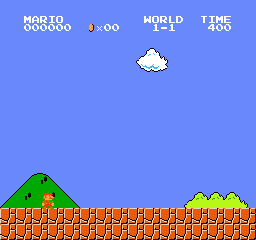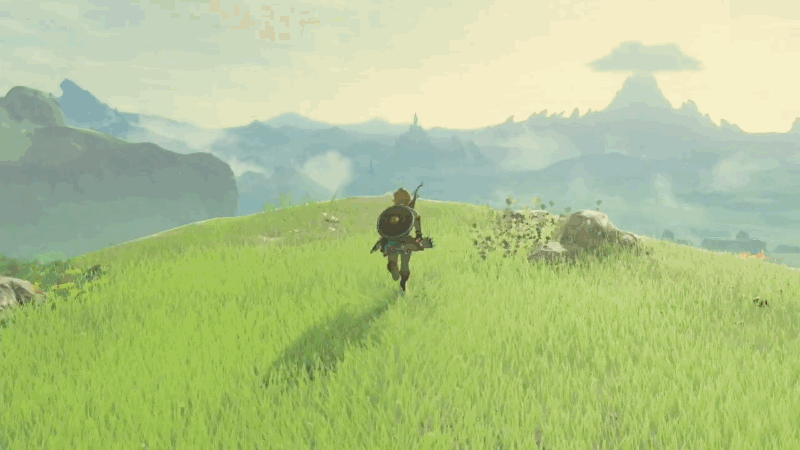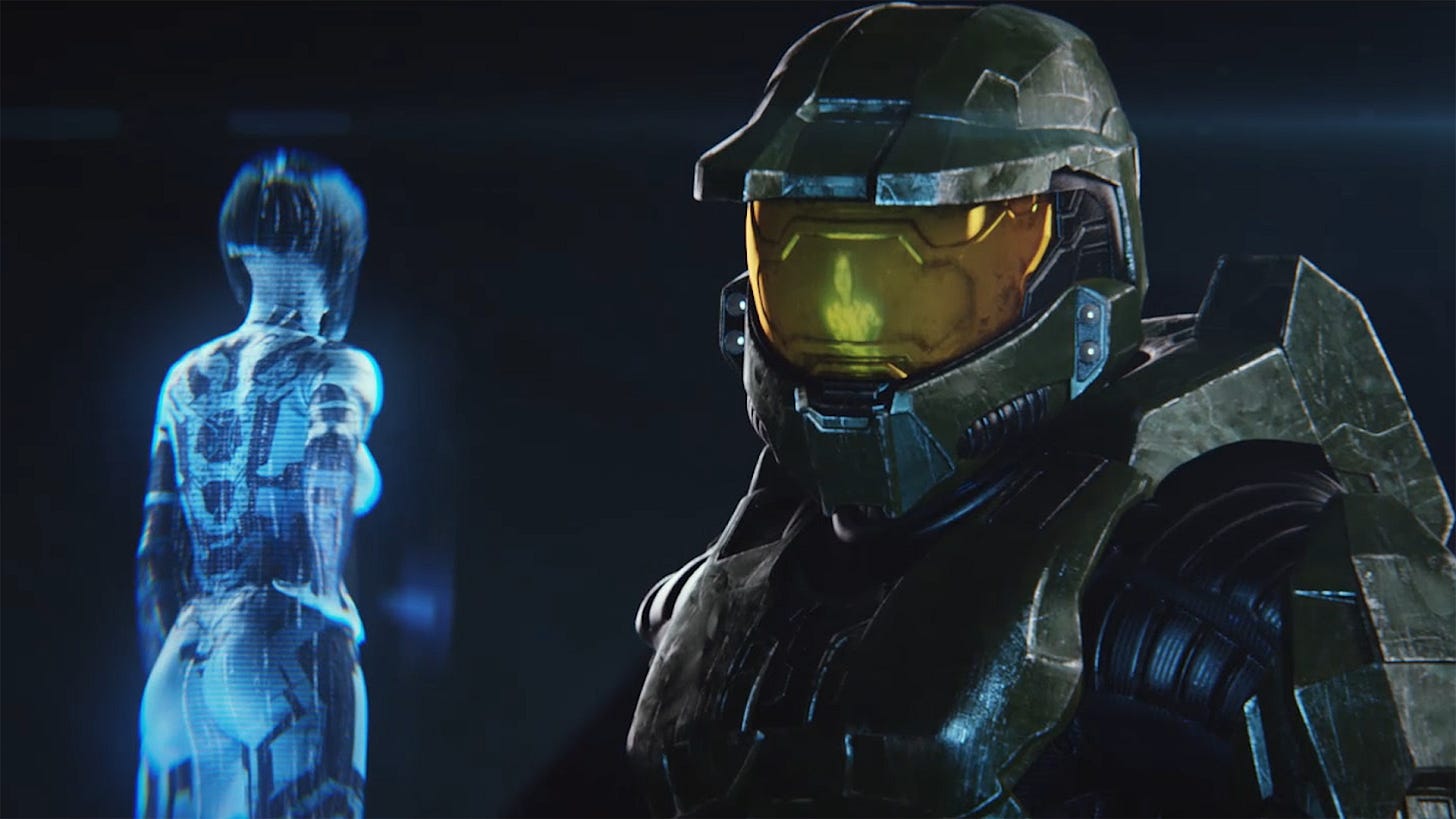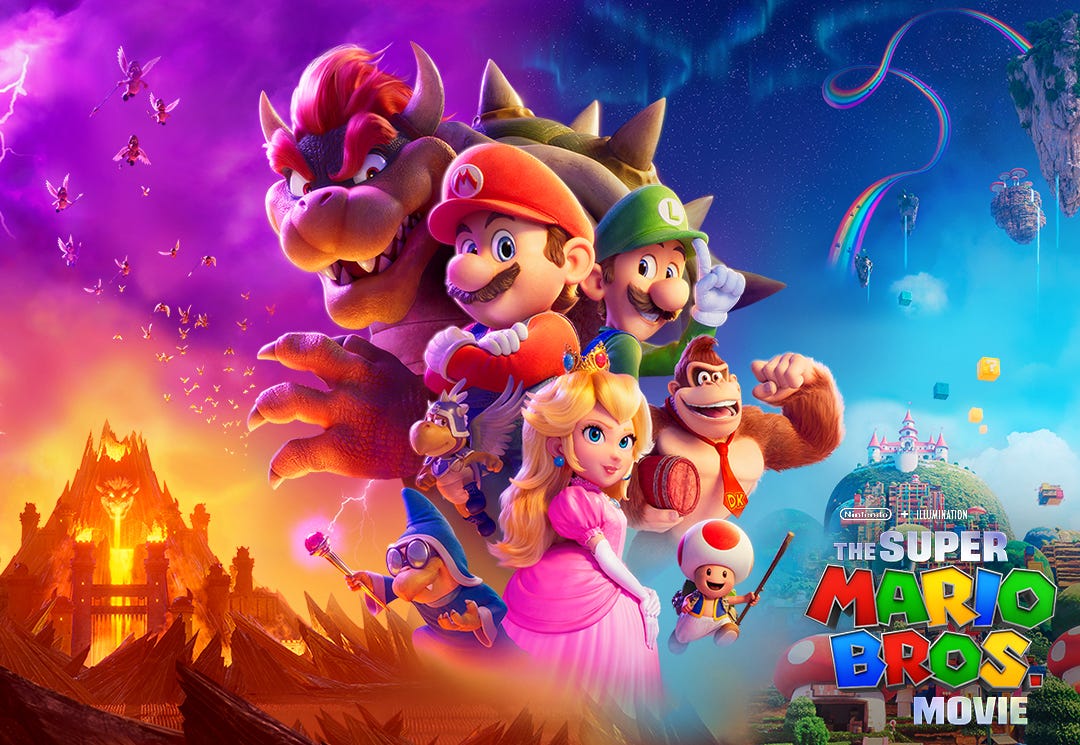Mario: Mustachioed Avenger Rescues In Overalls
The lovely Kat Bein joins this edition of Writer's Brain to discuss Mario and his colorful universe just as the storied franchise touches animated films (she also came up with that acronym).
As I get older I find myself crying a lot.
(What a lede right?)
Though I am not ashamed to admit that whatsoever because emotional candor is sexy af, one thing I did not expect to make me cry was The Super Mario Bros. Movie.
While I have been playing video games for essentially my entire life (at one point a Sega Genesis appeared in my line of sight and since then I haven’t been without a game console in my room), I never went tooooooooo deep into Mario.
I played the original 8-bit side-scroller all the way through on my Gameboy Color. I had a Nintendo 64. I remember playing Mario 64, and I think I beat it? Not in the “get all 120 stars” way. You only need 70 to actually face Bowser for the last time.
Oh, and I played the fucking shit out of Paper Mario and Paper Mario: The Thousand Year Door. Those two games define narrative mastery. I named my WiFi network after TEC. (IYKYK).
But I didn’t take it much further than that. I didn’t play any more of the hundreds of adventure-style games like Galaxy and Sunshine. I didn’t play any of the Mario sports games.
These days I’m mostly into AAA games that now include famous actors and A-list scriptwriting. Oh and excessive yet beautiful violence.
For the most part, my experience with Mario (outside of the paper universe) was playing games in which he was present like Mario Party, Mario Kart, and of course, Super Smash Bros. (I’m not nearly as good as I used to be).
The point is, the idea of crying throughout the duration of a 90-minute film dedicated to Mario seemed so unlikely to me.
And yet at so many beats that I won’t spoil here, tears were streaming down my face in the best way possible.
Because even though I do not share the same connection to Mario and his colorful universe as my friend Kat Bein, those games represent a time in my life that primarily consisted of the joy I still feel from playing video games.
That’s all I did when I was a kid. It was: get home from school, start playing games. Or go to a friend’s house and start playing games. I am of that section of the millennial generation where I watched video games evolve before my very eyes, and become the culture-shifting art form they are today.
That is an experience my friend Kat Bein and I share.
Overall, The Super Mario Bros. Movie was very enjoyable. A standard hero’s journey about a plumber from New York (an element borrowed from 1993’s live-action Super Mario Bros. starring Bob Hoskins, John Leguizamo, and Dennis Hopper) who ends up in the Mushroom Kingdom and has to save some stuff.
The plot played out mostly in line with my predictions (plus there are so many side-scroller moments, callbacks, and easter eggs, which is awesome). What there is no way to predict is the long-term ramifications of bringing Mario to the big screen.
Cartoon Mario has a voice now. And a concrete back story. In the game, he had none of that. He was this brave guy who never spoke and was always down to save a princess.
Essentially M.A.R.I.O. = Mustachioed Avenger Rescues In Overalls.
You can thank Kat for that acronym.

In the modern cinema market, what does a successful movie mean for the franchise? Almost certainly more movies, but will there be a TV show? Will the movie influence the games?
I found myself asking these questions. Cause I didn’t necessarily love what happened to my favorite game series when it went to television.
Subscribers to this newsletter will know that series is The Last of Us, and let’s just say I didn’t cry once in nine episodes of that show. Despite the fact that they interpolated scenes that make me bawl anime tear fountains in the game.
Then I asked the same questions to my friend Kat Bein.
We have now both watched our favorite game series transferred to a screen-without-controller-format in a time of invasive franchising.
And so, before either of us saw The Super Mario Bros. Movie (also just a few weeks before she visited Super Mario Land in LA), we discussed our shared love of video games (she owns every single Nintendo console starting with NES all the way to Switch) and what it means for them to enter this new era of existence.
HL: What is it about Mario specifically that’s created this dedication?
KB: It's just been such a mainstay of my life. I think everything about it is good. The music's great. The visual is great. I love how the characters have evolved over the years. It's funny. There's a sense of humor to it. The Paper Mario games are hilarious.
You just know them so well. Mario has been a part of my life my entire life.
I'm really happy that they came out with more side scrollers because the original Super Mario Brothers is my shit. It's basically an obstacle course. There's something fun about figuring it out. Then once you have it figured out—there's a certain type of skill involved in it that I am good at and so it's an opportunity to flex whatever that muscle is.
[Mario is] this alternate reality that I've spent so much of my time in. I’m just happy to spend more time in it all the time. I like to say that part of the reason why I dress so colorful, or I have colorful hair—I wish I could live inside a video game, but I can't.
Which is why I know that when I go to Mario Land, I'm going to ugly cry. I'm gonna lose my entire shit. I can't handle it. I won't look at the videos or the images because I want to have the experience for myself. That is my absolute dream come true. Being able to be inside the fucking Mario game
I am so fortunate that I get to live in a timeline where I have all this build-up obsession with Mario. Then I get to finally go inside Mario Land. That's going to be fucking insane.
HL: Nintendo has really only had two continuous franchises: Mario & Zelda. And in those games, there is so much that doesn’t change. They have the same villains. In many ways the same play. And yet, those franchises have some of the most loyal fanbases in the history of any sort of creative field.
What do you think it is about Nintendo that inspires that kind of loyalty?

KB: I feel like with PlayStation and Xbox the games that they promote are just totally different.
It's a lot of first-person shooters. It's a lot of gritty, real-world action, and I'm just more interested in the fantasy universe of Nintendo.
But I think what's interesting too is that our generation is the first generation that never had to give video games up. My dad played video games, but he doesn't still really play video games.
Obviously, our parents' generation started video game culture in the seventies and eighties generally, but it wasn't something that they kept necessarily identifying with.
Our generation, the millennials, came up with this new concept called emerging adulthood. There was a new phase of growing up that didn't exist socially for the previous generations, and when we were in our early twenties we didn't let go of a lot of the things that I think the previous generations let go of as they matured.
We also have never stopped being into Pokémon, or, any of the things that we were into as kids, and that's really very new.
I know this isn't exactly what you asked, but it's what I think about a lot. I don't think there ever has been an opportunity for people to be loyal to video games before this for their whole lifetime. It wasn't something that I did really thoughtfully, either. It's just always been a huge part of my life.
But It's just fun, so I've always kept playing them, and they keep coming out with more. There's no reason for me not to play the new Mario game.
HL: That's definitely interesting. Thinking about that same thing in terms of music, we're in dance music journalism, and yes, there's that super early dance music in the seventies and eighties. But then it was still super niche.
The music didn't sound that different than disco and other stuff that came before like that Jean-Michel Jarre electronic music from France. But then in the nineties with Daft Punk’s Homework, now it was its own thing. And the people who got into it then, even though they weren't first, those are the people who never gave it up.
KB: I think about that, too.
I'm sure those people hear, “You still like going to the club? You didn’t grow out of that phase?” but say someone was 20 in 1997 when Homework came out. They would 46 today.
When I see someone who's like 46-50 at like a club in LA—there aren't a lot of other people there who are that age. But that's just something that they’ve been doing. That's what they like to do.

Joe Rogan had his whole thing on video games, where he said he has a problem with them because when you spend all your time playing video games, you're not spending your time developing a skill.
KB: But I think that that's bullshit, too, because while I was stuck on the couch for a month, the moment I realized, “Why am I just watching TV? I could be playing Paper Mario,” it was a way better use of my time because I'm not just consuming the video game. I'm also playing an active role in the video games.
Video games are so active. You’re the main character in this story. I feel like it's a pretty cool way to explore a storyline. It's like one deeper than a movie or a book because you're propelling the adventure forward and choosing which direction you're going to take.
That's what I like about the Nintendo-style games, too. They are all puzzles. Mario is very much an obstacle course/puzzle. Zelda’s a fucking giant puzzle. You just have to figure stuff out, and it's rewarding when you solve the puzzle.
If all you did was play video games like…but honestly, if all you do is play video games, and you're having fun, then who cares? You don't have to live anyone else's idea of what your life should be. As long as you feed yourself and take a shower. And pay your bills who really cares? Do whatever you want with your time and your money.
HL: Very true. And in response to The Last of Us TV show, I just played the first and second games again and I'm not gonna go off on this tangent, but let's just say the reason I could look at the show and have the opinion that this is factually not as good as the game is that playing those games and story-driven games actually helps me understand narrative structure, which 100% makes my journalism way better.
There's a reason journalists still write “stories.” Is it fiction? No, but it's definitely still a story that needs to have specific beats and transitions and things like that.
Before the show was even a thing. I wrote a 10,000-word review/analysis of the second game, which was essentially me flexing, “Look at how I can analyze this shit.” That's the longest I've written about anything ever.
It was the idea of diving into the actual story of The Last of Us—it's the story that made me want to get a tattoo and write 10,000 words. So that's not without its own value. Beyond the recreation of just playing, there's something being gained from that for sure.
KB: Yeah while I don't think that Mario or any of the Nintendo games have such an intellectually rich narrative, they have created a universe that's so familiar with characters that do actually develop and change over time.
I think it's something about the familiarity. It’s a pleasant universe that you want to return to. My pal Mario, let's go save Princess Peach.
But it's just fun. And Mario Kart’s sick. I think what they realized at some point was that they can slap the Mario characters on pretty much anything. They realized that with Mario 2. Mario 2 was a different game that at the last minute they just slapped Mario characters over and that's why it's different from all the other Mario games.
Mario Golf. Mario fucking Olympics! Dr. Mario. Tetris Mario. Fucking anything you want. Put Mario on it, and people want to play it because Mario's fucking awesome.
HL: It leads back to the purpose of characters like Mario because in a lot of ways he doesn't have a personality. He doesn't say anything. He's a way to project yourself. When he's playing soccer or playing golf or driving this race that has you on this fucking acid trip, Rainbow Road. It's about you doing that.
There are other versions of that kind of character within games. One is Master Chief from Halo. You never see his face. He barely says any words. He's this heroic big soldier guy. It's a similar dynamic of inserting yourself into this role.

One thing I'll say about The Last of Us is I relate to Ellie as a character, but I don't feel like it's me doing those things in the same kind of way.
Mario is such an old character. There was no way to give him a personality back then. Now they could have given him a voice, but I think people would have been upset. Which brings me to my next question.
In the movie, he is going to have a voice from Chris Pratt, who is a good choice, in my opinion. But with this idea of Mario having this definition attached to him: there's gonna be a voice; there's going to be mannerisms.
Before this, all we knew about Mario is he’s pretty brave to fight this battle a billion times. Now we're about to learn a fuckload about this guy, even though we’ve known nothing about him for 30 years. How do you feel about that?
KB: Well, I did see the original Mario Brothers movie in the early nineties. John Leguizamo. He was Luigi. Who is Mario? I mean, I haven't seen it in years. I want to watch it over again now that this other movie is coming out. Bob Hoskins. And Dennis Hopper's Bowser. Amazing. There was also a cartoon of Mario when I was a kid.
So in that original movie. It really leaned into the Italian plumber from New York City type of vibe. But honestly, [Mario in the games] makes no fucking sense. I think that's part of what's so fun about it. It's the most surreal, whimsical bullshit.
A plumber. Traveling through pipes. Then he eats mushrooms to gain strength. Stars, for some reason, make him invincible.
The whole thing is nonsensical. It doesn't make any sense. They literally just threw anything at the wall. But now all of that has become canon, and we all know how it works.
Overall, I'm excited about the movie because I'm excited for anything that has to do with Mario.
I'm not sure how I feel about Chris Pratt. Also, entirely to your point, I almost am worried about Mario in particular because he's such an open character. He can represent whatever you want him to represent.
If It doesn't feel true to Mario that's gonna make me a little sad. I'm not worried about anything else in the movie. But even though Mario is kind of sans personality, I feel very strongly about the way Mario should be. And so I'm a little worried about that.
HL: This is the thing about The Last of Us going from game to television. What I didn't consider at all was the idea of people who are going to watch the show without playing the games.
There are people in this universe who have never played a Mario game and are going to have their first-ever experience watching the movie.
KB: And they’re all like four years old.
HL: But some of them might be older than that! I remember when The Last of Us show came out. It had never occurred to me that people are going to engage with this story that I’ve been fucking living and dying for so long—they're gonna start here. Like really?
KB: It does seem crazy to imagine that you would start your Mario journey with this movie.
HL: That's crazy to me, too. If they hadn't made The Last of Us show, I never would have thought about that. Mario’s even more accessible.
KB: It’s so ubiquitous
HL: It's been around for so much longer. Everybody's watched someone else play Mario Kart, or played Mario Party at their young birthday parties when they were like six and all the parents were there.
But still, with the way the numbers work, there are going to be people for whom this is the first Mario thing ever. It might be adults who never played games but are taking their kids to the movie.
KB: I don't have a memory of first discovering Mario. Mario has just literally been there my whole life as far as I know. I remember already really liking those games, and I remember the first time someone showed me how to get the whistle in Mario 3 and I was like, “Whoa! I thought I knew everything.”
So, by that time I was already like, “You don't have to tell me about Mario. I know, bro.”
I don't really recall feeling like I don't know this universe inside and out. But I think that now is a better time for a Mario movie than 1993 because there has been so much more developed about the universe.
Mario has been put in so many different types of situations that it feels like you have more to explore. In the 1993 movie, they took some basic characters and tried to imagine an origin story for Mario, and they did it in this funny action, gritty way.
But in this one, they're like, “Oh, we get it you like cartoon Mario so we're gonna keep the movie cartoon Mario and we're not trying to make it anything that it isn't.
That's what I'm excited about seeing. I'm just excited about seeing all the characters that I know and love come to life in some sort of narrative form.
Like I said, I might end up being like, “I don't know if that was an accurate portrayal of Mario,” which is hilarious to say, given that we’ve now explored that he doesn't have a personality.
I guess it's exactly for that reason that in my mind Mario is a certain way because he can be whatever I want him to be.
HL: One last question. This is kind of an after-the-fact question. To relate it to my own connection with The Last of Us—just to clear the air on this I've boiled down my overall opinion on the show into three lines, so I don’t talk people's ears off when they don't want want to hear it:
Number one: It's the best video game adaptation ever.
Number two: It's a great piece of television on its own based on its own merits.
Then number three: It does not slap like the game.
So, overall what really vexes me about it is that the games are not complete yet, and the show in ways is fundamentally different than the games.
I’m afraid that because the show is so much more accessible than the games those fundamental changes are going to affect the way that the creators of the games go into the gaming world.
I also think the show concept could be endlessly fucking franchised because that’s what studios do these days. There would eventually be so many “The World of The Last of Us” shows that are going to be subpar that they're fucking churning out on the basis of the name.
I guess Mario is different in that regard because it's already this gigantic sprawling thing, so I feel like a franchise of movies, and maybe TV wouldn’t switch things up too much.
But what are your thoughts in that regard? About a franchise and how changes in the movie could affect the games.
KB: I feel like the games are pretty bulletproof at this point because they've been going for so long. Like you said, it's already so expansive. They've got spinoff games. There's just so much.
They have the animated cartoon in the nineties, and I don't think that or the nineties movie affected the games at all. It's only maybe helped to ingratiate kids with the games more.
But if somehow it did—if we came out of the movie with more talking Mario I think that would be weird. I think that would quintessentially change the way it feels because I think that the universal quality of it is part of what makes it so nice.
As we're talking about it that does make sense. They're never speaking a language. You're reading. It's always just noises, but people identify with these characters. They can fall in love with them because they're devoid of any culture other than their own.
That's what makes it so interesting. It's really this hugely rich, lore-filled universe now, but it doesn't have markers of any real place. Its culture is not tied to any actual culture on Earth. It’s its own weird universe.
Maybe that's part of what makes it so universal, and maybe that's even part of what makes it something that you can love your entire life because you don't have to have a stance on it.
There's no, “But then I grew up out of whatever that fun stuff was.” It's literal, pure, rainbow fun. Solve the obstacle. Solve the problem. Save the princess. Jump on the Koopa. Don't lose your hat.






